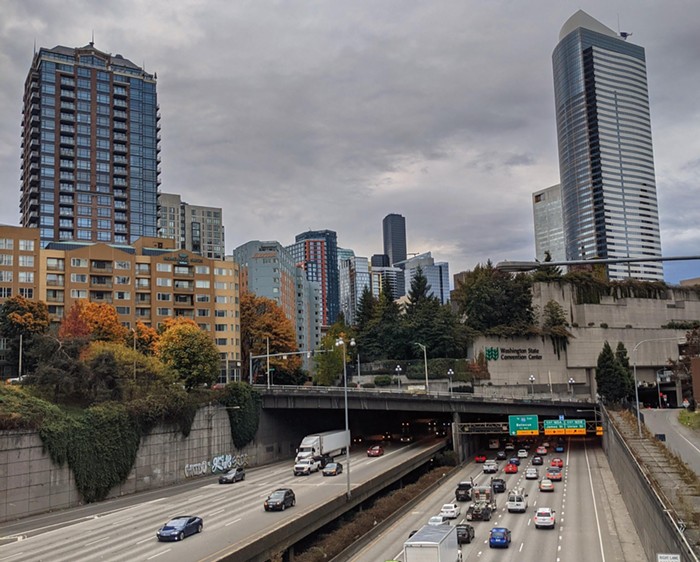
SeaSk8, the skate park at Seattle Center, has gone through more than a few iterations over the years. It’s also a vital part of operations for Skate Like A Girl, a non-profit which empowers female-identified youth through skateboarding.
Now it looks like the city, despite pressure from some prominent local musicians, is going with the Oak View Group’s plan to redevelop the arena into a massive entertainment and sports venue. Part of those plans include scrapping the skate park at Seattle Center to build a parking lot, and relocating it somewhere else.
But some members of the skateboarding community are worried about where the new skate park is going to be, and what the real cost will be—financially, and for their community.
The first time Skate Like A Girl heard about the skate park’s demolition was at a meeting on September 20 about plans for the redevelopment.
“Once we started asking, it kind of came to the surface, and that's when we were told that the skate park would be relocated,” says Kristin Ebeling, executive director of Skate Like A Girl.
But where will the skate park be relocated?
“That is the big unknown at this point,” Ebeling says. “But having a skate park in close proximity to our headquarters is extremely important to us in terms of being able to run our programs.” Skate Like A Girl uses the park all the time to host classes for youth and train staff and volunteers.
In the official memorandum of understanding (MOU) the Oak View Group agreed to give the City $1.5 million to relocate the Seattle Center Skate Park “and other public amenities, like the Campus Maintenance Facility.”
But it’s also in the MOU that beyond throwing down some dollars to build a new park, the Oak View Group has “no further responsibilities of obligations” to locate an alternative space for the skate park—that’s up to the city.
According to Joe Mirabella, director of communications for the Seattle Office of Economic Development and Office of Film + Music, the “city is currently reviewing existing property to find a location that will accommodate the skate park.”
Skateboarder Matt Johnston has been an advocate for the skateboarding community ever since he saw the Ballard Bowl get torn down in 2004. He’s helped the city plan new projects as a member of the skate park advisory committee for the Parks Department, providing “the tactical kind of support for Seattle's effort to create skate parks,” he says.
Johnston took a look at the MOU for Key Arena and wasn’t pleased that the skate park’s replacement plan was reduced to “a scant footnote in the overall document.”
“And it was something that is so important to us, and such a big part of the Seattle skateboarding community, just sort of reduced to a single line item, conflated with two other projects, a maintenance building, and this weird vague, description of public amenities,” he says.
Because he knows about just what goes into building a skate park, like multiple design reviews, environmental mitigation, and other complexities, Johnston is also concerned that the cost of rebuilding will be more than the $1.5 million that has been budgeted. It all depends on where the new skate park site will be, and the uncertainty surrounding the new location doesn’t help.
“Because we don’t have a site, we can't get the numbers,” he says.
The current incarnation of SeaSk8, Johnston says, wound up costing almost $3 million dollars. Even smaller parks, like the one in Lake City, cost a pretty penny to build—about $800,000.
He also worries that it may even be too late—if there’s not a plan to rebuild the park with a nearby replacement so that the new one is up and running before the old one is demolished, the community will scatter.
“Skate Parks serve a lot of teenagers, a lot of kids and families, and it's a place to hang out. It's a place to meet your friends. It's a place to catch up on what's been going on in their lives. And so, when you remove that foundation the community calls home, you also destroy that community.”
Skate Like A Girl’s Kristin Ebeling agrees. She says SeaSk8’s central location is easy to get to for the wide community of young skaters they serve.
“It's not just about just losing a skate park, but losing community programming for our residents,” she says. “And we hope that doesn't get lost in the shuffle and the excitement of building a new stadium—which is also awesome—but I feel like this can be a both/and.”
Skate Like A Girl says that Seattle Center has “promised them a home here,” and have been working with them on setting up meetings to be part of the decision-making process with the city and Parks Department.
“We really hope to work with the Seattle Center and Seattle Parks to find an equitable solution because right now it's a little easy to feel like a little fish,” she says. “So, we're really hoping to get a voice at the table.”


















